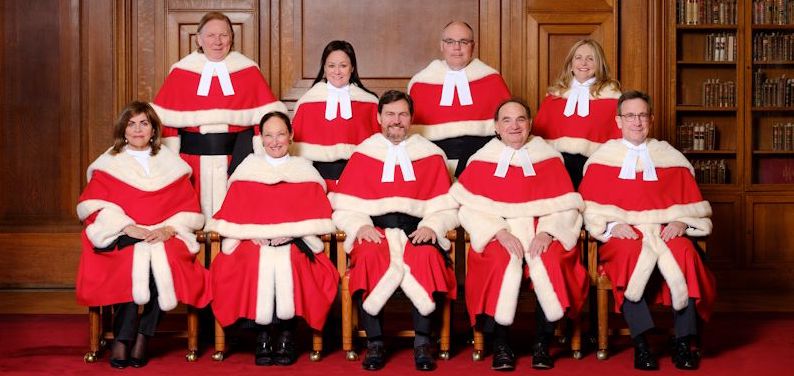The Supreme Court’s 7-2 decision this week that says the federal government does not have the duty to consult Indigenous people when drafting laws, includes a powerful opposing opinion.
The two dissenting judges emphatically and eloquently support the Indigenous position. And over time, that powerful dissenting opinion might carry more weight than the majority’s.
The case goes back to 2012, at a time when Stephen Harper’s Conservative government was perfecting the art of the omnibus bill. One such bill, a technical budget bill, used the fine print to radically change both the fisheries act and the approval process for large resource projects.
Indigenous groups across the country saw those stealth legislative changes as threats to their hunting, fishing, harvesting and other land-use rights, many of them guaranteed by treaty. One group, the Mikisew Cree First Nation of Alberta, initiated a court case, arguing that the Crown’s constitutional duty to consider the rights of Indigenous groups includes consultations during the legislative drafting process.
A lower court upheld that principle, but the majority on the Supreme Court has just said no dice.
The majority decision rules that the Crown, the executive branch of government, does, indeed, have a duty to consult with Indigenous peoples, which is why the cabinet had to fully consult First Nations on Trans Mountain. However, the seven judges declare that duty does not extend to the legislative branch – Parliament.
“The duty to consult doctrine is ill‑suited for legislative action,” Justice Andromache Karakatsanis wrote on behalf of the majority.
The judge points out that there is considerable precedent requiring the Crown to consider Indigenous rights and consult with Indigenous groups as it conducts its activities on the ground. However, she emphasizes, there is no precedent whatsoever that requires parliamentarians in the act of crafting and considering legislation to engage in such consultations. And, she adds, it would be impractical to do so.
A dissent that relies on many precedents
Justice Rosie Abella respectfully, but forcefully, disagrees, and the newest Supreme Court judge, Sheilah Martin concurs.
“The duty to consult arises based on the effect, not the source, of the government action,” Abella wrote, “The Crown’s overarching responsibility to act honourably in all its dealings with Indigenous peoples does not depend on the formal label applied to the type of action that the government takes with respect to Aboriginal rights and interests protected by section 35 of the Constitution Act of 1982.”
Section 35 refers to a provision that was quite literally forced on the current prime minister’s father, Pierre Elliott Trudeau, when he was negotiating the package of constitutional changes that included a charter of rights and a made-in-Canada formula for amending the constitution in the future.
These days, we pay lip service to the idea that Indigenous groups are founding peoples of Canada. Back in Pierre Trudeau’s time, nearly 40 years ago, hardly anyone noticed when Indigenous peoples were entirely left out of the all-white-male constitutional process. The Indigenous leadership of the time had to force its way in: first by going to the Supreme Court and then by appealing to the actual Crown, the Queen in London.
As a last-minute compromise, Pierre Trudeau and the provincial premiers agreed to a one-sentence addition to the new constitution, namely: “The existing Aboriginal and treaty rights of the Aboriginal peoples of Canada are hereby recognized and affirmed.”
The terms of that begrudgingly accepted add-on were not defined at the time. But since then a series of court rulings have put flesh on the bones of the idea of Aboriginal and treaty rights.
Justice Abella cites a number of those rulings, notably the 1997 Supreme Court decision in the case known as Delgamuukw. That ruling affirmed that the undefined wording of section 35 could, in practice, entail exclusive Indigenous rights to significant pieces of unceded territory.
Abella quotes the portion of that 1997 decision that states that while the nature and scope of the obligation to consult might vary, “there is always a duty to consult.”
Based on both recent precedents and some going back half a century, Abella argues that in all its actions –whether they be those of crafting laws or of enforcing them – the Crown has a duty to consider the interests and rights of Indigenous peoples and to consult with them.
“There is no doctrinal or conceptual justification which would preclude a duty to consult in the legislative context,” Abella argues.
The majority decision tells Indigenous groups that although they cannot, as a matter of course, insist on being included in the process of making laws, they do have the unfettered right to challenge those laws in court, once they are passed.
Abella says it is unfair to force Indigenous peoples to wait until after laws abridging their rights are passed to then challenge them in court. She says the burden should be on the legislators, even if it might require them to work somewhat differently.
If Parliament were to accept its obligation to consider Indigenous rights at the outset when creating new laws, it might, Abella recognizes, “have an impact on the legislative process. “
She then adds bluntly that such an impact is simply an unavoidable fact of life “if the guarantee under section 35 is to be taken seriously.”
The senior judge on the current court then pushes the argument to its logical conclusion with this powerful and difficult-to-refute statement:
“Adjustments to the legislative process cannot justify the erasure of constitutionally mandated rights. Indeed, there would be little point in having a Constitution if legislatures could proceed as if it did not exist when expedient.”
Karl Nerenberg has been a journalist and filmmaker for more than 25 years. He is rabble’s politics reporter.
Photo source: The Supreme Court of Canada




